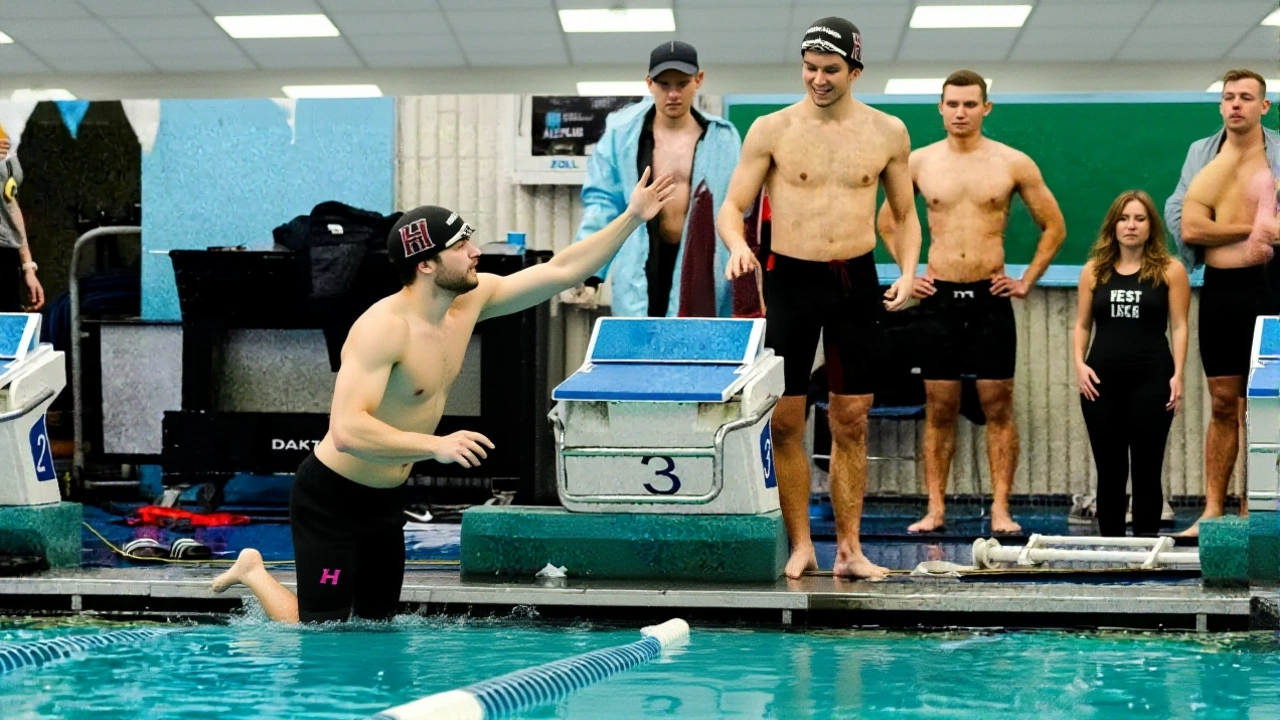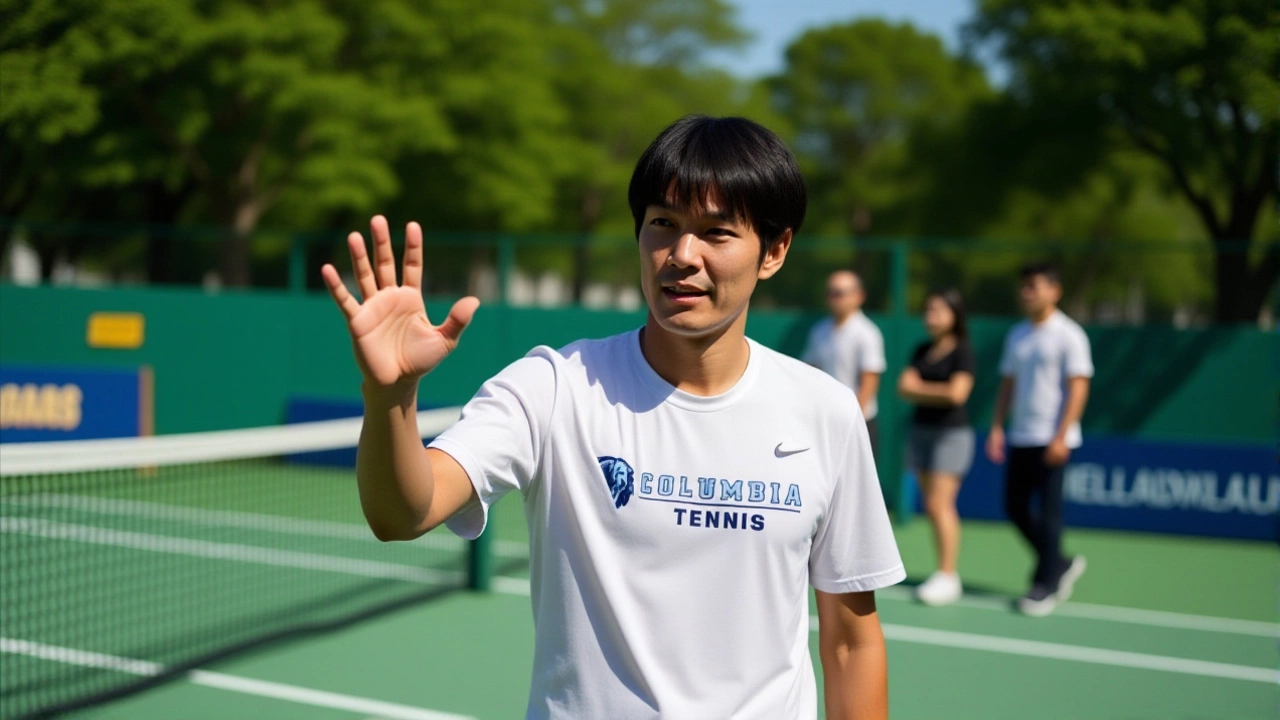When Adam Poliakov punched a shot past Princeton’s goalkeeper in the 67th minute on November 13, 2025, it wasn’t just a goal—it was the final spark in Harvard’s season. The first-year forward from Kiev, Ukraine had been on fire all fall, but that moment against the No. 3-ranked Tigers sealed his place in Ivy League history. Hours after the 2-1 loss to Princeton in the semifinals at Myslik Field at Roberts Stadium, Harvard announced Poliakov and sophomore defender Alexander Castel had earned spots on the Ivy League All-Tournament Team. It was a rare double honor for a team that didn’t win the title—but still left a mark.
A Rookie Who Changed the Game
Poliakov didn’t just arrive at Harvard—he exploded onto the scene. In just nine games, he scored six goals and added one assist for 13 points, all of it happening in a furious six-game stretch where he found the net in every contest. His five-game goal streak in October and November? Unheard of for a freshman in the Ivy League. He wasn’t just scoring; he was clutch. Two of his goals were game-winners in conference play: one against Brown on October 18 and another at Dartmouth on November 10, a 3-1 win that locked Harvard into the tournament. The Ivy League noticed. He was named Offensive Player of the Week twice—on October 20 and again on November 10—and then swept the Rookie of the Year award unanimously, becoming Harvard’s ninth recipient since the honor began in 2001.What made Poliakov’s season even more remarkable? He did it while playing through constant defensive attention. Opponents knew where he was. They doubled him. They tracked his runs. And still, he found space. His six goals in 2025 tied for third-most in the Ivy League, and his four conference goals ranked second. His 11 points in league play? Third-best. The numbers don’t lie: he was the engine of Harvard’s attack.
The Anchor Behind the Attack
While Poliakov stole headlines, Alexander Castel was the quiet force holding it all together. The 6’1” center back started 16 of Harvard’s 17 games, logging 1,412 minutes—second only to goalkeeper Lucian Wood. He didn’t light up the scoreboard, but his presence was felt in the clean sheets. Harvard posted five shutouts this season, and Castel was a central reason why. He wasn’t just a defender; he was a playmaker from the back. His goal against Stonehill on October 22 was a game-winner, and his assist came in a tight 1-0 win over Yale. He’s the kind of player coaches dream of: reliable, composed, and physically dominant in the air.His consistency stood out. In a league where injuries and rotations plague teams, Castel was a constant. He didn’t miss a start after his first game. He didn’t get a red card all season. He even managed to play 90 minutes in Princeton’s high-pressure semifinal, despite the Crimson being outshot 18-5. That’s leadership.

Harvard’s Quiet Consistency
This wasn’t a fluke. Harvard has finished in the top half of the Ivy League standings every year since 2021: fourth in 2021, third in 2022, second in 2023, fourth in 2024, and again fourth in 2025. That’s five straight years of top-four finishes. While Princeton (11th Ivy title) and Cornell (champions) got the spotlight, Harvard quietly built a program that competes every year. They’ve made the tournament in two of the three years it’s been held. They don’t always win it—but they’re always there.The program’s depth showed in other honors. Sophomore midfielder Phoenix Wooten made First Team All-Ivy. Junior forward Andreas Savva earned Honorable Mention. Senior defender Ethan Veghte was Academic All-Ivy. Goalkeepers Lucian Wood and Cullen MacNeil split Defensive Player of the Week honors. Harvard didn’t just have two stars—they had a team.

What’s Next?
Poliakov’s breakout raises expectations for 2026. Can he repeat? Can he lead Harvard to its first Ivy title since 2007? Castel’s development will be critical too—he’s the only returning starter from the back line with significant experience. With a core of underclassmen now proven at this level, Harvard isn’t rebuilding. They’re reloading.The Ivy League’s power structure still leans toward Princeton and Cornell. But Harvard’s rise isn’t just about talent. It’s about culture. The Crimson didn’t need a top-five recruiting class to get here. They needed smart coaching, resilience, and players who showed up when it mattered. Poliakov and Castel? They didn’t just earn All-Tournament honors. They proved Harvard belongs in the conversation.
Frequently Asked Questions
How did Adam Poliakov’s performance compare to other Ivy League freshmen this season?
Poliakov’s six goals and 13 points were the most by any Ivy League freshman in 2025. He ranked sixth in the entire conference in goals and eighth in points, despite playing fewer games than most starters. His five-game goal streak was the longest by a freshman in the Ivy League since 2017. No other rookie earned Offensive Player of the Week twice, and he was the only freshman named to the All-Tournament Team.
Why didn’t Harvard win the Ivy League Tournament despite finishing fourth?
The Ivy League tournament is single-elimination, and Harvard faced the top-seeded and nationally ranked Princeton Tigers in the semifinals—a tough draw. Princeton won 2-1, with Poliakov scoring Harvard’s lone goal. Finishing fourth meant a road game against the best team in the league. Harvard’s season record (7-5-3) was competitive, but tournament success often hinges on matchups, not regular-season standings.
What role did Alexander Castel play in Harvard’s defensive success?
Castel started every game he played, logging over 1,400 minutes and anchoring a back line that recorded five shutouts. He was the primary organizer in central defense, often marking opposing strikers and winning aerial duels. His one goal and one assist came from set pieces, showing his threat on offense too. His consistency helped Harvard allow just 1.1 goals per game in conference play—the third-best mark in the league.
Has Harvard ever won an Ivy League men’s soccer title?
Yes—but not recently. Harvard last won the Ivy League regular season title in 2007 and captured the tournament championship in 2007 and 2009. Since then, they’ve been consistently competitive but haven’t reached the final since 2014. The 2025 season marked their deepest tournament run since 2021, when they lost in the semifinals to Princeton as well. With Poliakov and Castel returning, 2026 could be their best shot in over a decade.
Who were the other major award winners in the 2025 Ivy League men’s soccer season?
Princeton’s Daniel Ittycheria was named Offensive Player of the Year, while teammate Andrew Samuels took Defensive Player of the Year. Princeton’s coaching staff, led by Jim Barlow, earned Coaching Staff of the Year after guiding the Tigers to their first Ivy title since 2021 and a national ranking as high as No. 3. Cornell’s goalkeeper, Aidan Fagan, also earned First Team All-Ivy honors after recording eight shutouts.
What does this mean for Harvard’s recruiting going forward?
Poliakov’s success from Ukraine signals Harvard’s growing global reach in soccer recruiting. His rise proves the program can develop international talent into Ivy League stars. Combined with Castel’s steady growth, it shows Harvard isn’t just recruiting top high school players—it’s finding athletes who fit their system. Expect more international prospects to be targeted, especially from Eastern Europe and Latin America, where technical skill meets tactical discipline.
